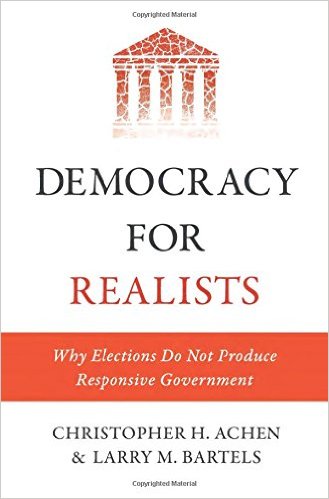By MARTHA MINOW
Review of Democracy for Realists: Why Elections Do Not a Produce Responsive Government, by Christopher H. Aches and Larry M. Bartels, and Power Play: How Video Games Can Save the World, by Asi Burak and Laura Parker
Princeton: Princeton University Press, 2016
New York: St. Martin's Press, 2017
The widespread confusion and anxieties about the 2016 presidential election in the United States, and the Brexit vote in Great Britain, can be replaced with the evidence and ideas offered by political scientists Christopher Achen and Larry Bartels--and real hope may lie in the seeming diversions of video games. Achen and Bartels analyze U.S. elections since 1916 and show that most citizens have been poorly informed about and largely uninterested in politics and display no consistency in their policy preferences (pp.14, 36-51). Direct-democracy devices, such as referenda, have either empowered wealthy interests or individuals, or generated results contrary to their stated goals (pp. 15, 68-86). Voters hold officials accountable for natural disasters, a pattern casting doubt on the idea that voters can sensibly assess and assign blame for the behavior of their elected representatives (pp. 15,116-145). Voters also reward officials for positive economic patterns just before an election, but not for long-term economic growth (pp. 16, 145-176). Achen and Bartels argue that the patterns they find empirically best fit a "group theory of democracy": people vote based on group affiliations and loyalties rather than to hold officials accountable or to express their policy preferences. Group stereotypes, and efforts to strengthen group identities by drawing distinctions from others, appear more crucial to voting patterns than do ideologies, policy proposals, or the ideals of reasoned deliberation and rule by all the people.
Turning off the new and turning on entertainment is an understandable response to current events. Those still yearning for good policies and political progress would do well to turn also to writings about entertainment as sources for cultural values. Readers of Power Play: How Video Games Can Save the World will find even more direct potential for cultural practices. As a key player in efforts to design video games to achieve social impact, Asi Burak writes with technology journalist Laura Parker about fascinating initiatives, designing and distributing games that address the Israeli-Palestinian conflict ("Peacemaker"), the U.S Constitution and political system ("iCivics"), interracial community building ("Macon Money"), images and realities of Arabs ("Saudi Girls Revolution,"), women's health and life chances ("Nine Minutes or Pregnancy"), and children's cancer treatments ("Re-Mission games"). Other games identify biochemical structures relevant to diseases and treatments ("Foldit" and "Nanocrafter"), crowdsource scientific discovery ("Testmybrain", "Lab in the Wild", "Galaxy Zoo", "Zooniverse"), help to enhance attention and decrease reliance on medications for attention deficit disorder ("Throw Trucks with Your Mind", "Project Evo"), or reduce cognitive decline ("NeuroRacer", "Project Evo") (Power Play, chapters 1-8).
Experiments with new games seek to promote people's altruism, empathy, sense of rhythm, abilities to multitask, and decisionmaking under time pressure (Power Play pp. 192-195, 219, 221). Besides showing the power of networks in organizing people to solve problems, these initiatives highlight the ways their engagement with digital technologies can shape human brains and capacities. Research indicates that high-quality video games can improve the attention, spatial navigation, memory, perception, problem-solving, and emotional resilience of young people (pp. 205-206).
What if games could develop people's capacities to empathize across identity groups? Video games and virtual reality experiments allow people to have experiences being in a body of a different age or gender (Power Play, pp. 213, 215, 219-223, 229-230). Games can also sharpen peoples' decisionmaking abilities, and even their ability to delay gratification (Power Play, p.3). Maybe the problems with democracy could be mitigated with more video game-playing-- if it is game playing of the right kind.
MARTHA MINOW is the Morgan and Helen Chu Professor of Law and the Dean of Harvard Law School.

